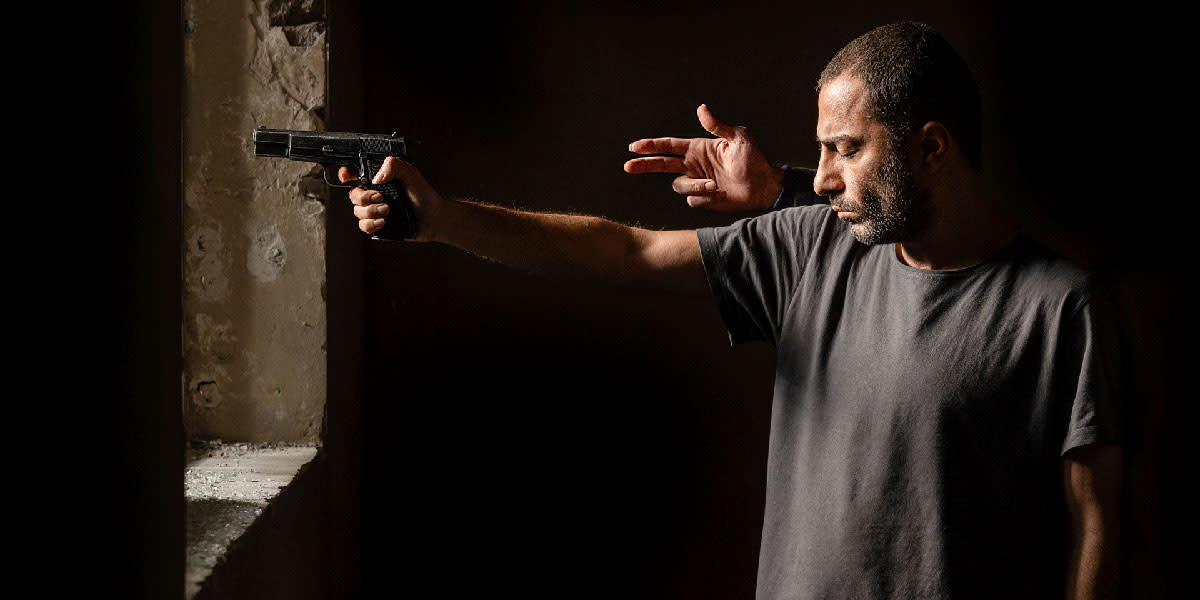‘Beyond the Wall’ Review: A Blind Man Shelters a Woman on the Run in Iran

- Oops!Something went wrong.Please try again later.
- Oops!Something went wrong.Please try again later.
While the history of cinema is filled with flawed portrayals of disabilities this new era seems to have invited some ingenuity. “Sound of Metal” used brilliant sound design to show the deterioration and distortion of deafness. Similarly
The film, at first seems like it may be building to an art-house Iranian version of shlocky horror-pic “Don’t Breathe.” Leila (Diana Habibi), a desperate woman on the run, finds shelter in a Spartan apartment. While the sirens call outside and the police flood the building, she huddles under a table, hand over her own mouth trying to stifle her own sobs. The apartment belongs to Ali (Navid Mohammadzadeh), a man who has lost most of his vision and despite what his doctor says, has little interest in taking the required medications to preserve what little he has left. The film shows us scenes from Ali’s point of view, how the light and shadow still dance in the periphery and he is able to make out some of the words in a letter or a phone screen by pressing his face against them.
More from IndieWire
'No Bears' Review: Now Imprisoned Jafar Panahi Tenderly Shows the Difficulty of Leaving Iran
'The Inspection' Review: Elegance Bratton Turns His Pain Into Great Beauty
Ali has no intention of adapting to this new world, his whole body is covered in cuts and bruises, as he is yet to memorize the layout of the apartment, and the film eschews the well-worn cliche of blindness significantly heightening the other senses. Instead we are introduced to a man who has lost everything he ever cared about, alone and longing for the family that will no longer speak to him, attempting suicide in the shower. The suicide itself is about as brutal an opening scene as possible. Ali pants heavily in the shower, before summoning the strength to wrap a wet t-shirt around his head, place a plastic bag over his head and bind his arms. The camera, agonizingly, never turns away and we are forced to confront the horror of this act. As his basest survival kicks in he breathes heavier and squirms, instinctively trying to free himself and the scene becomes increasingly, but fittingly, difficult to watch.
When the attempt fails Ali seems shaken but not relieved, it is only through harboring Leila from authorities that he has a renewed sense of purpose. Leila, having stumbled upon the apartment in a confused and hysterical run from the police, has to be coaxed out gradually like a shy door-mouse but Ali approaches her with gentle determination. As he eats the dinner his neighbor has prepared he meticulously divides the dish in two, polishes the plate and spoon and leaves it out for her to enjoy at her leisure. The two form a tentative bond, but Leila is so terrified that she can barely muster a word. When she does finally trust in Ali enough to start speaking it is a great relief, particularly since the film has only a few lines of dialogue in its first 30 minutes.
The two then enter into a tender domestic arrangement. Ali tries to keep her safe and advise her on the best course of action to evade the authorities surrounding the building while she gently tends to his wounds. The story of how she ended up in this terrible circumstance is told in flashback but with much more ingenious use of direction than is standard. The flashbacks fold into the present, with gunfire of the past indistinguishable from door knocking in the present, screams of a neighbor become screams of an unpaid worker demanding his money, only to be dragged off by police. That meshing of memory into the present has such visceral power, as if their trauma is able to reach out though history and grab them by the throat.
We see Leila as she was before “the incident,” a woman smartly dressed in black, cradling her beloved toddler son with warm serenity. She barely resembles the woman in a bloodstained shirt and ripped hijab that is shaking in the apartment.
Performances from both Mohammadzedah and Habibi are excellent, jittery and and despairing from top to toe. But as the plot unspools, some of the answers it provides aren’t as interesting as the initial questions. Meanwhile larger ideas around the significance of losing your ability to surveil while in a surveillance state are slightly undernourished.
Grimness of their situation aside, the cruelty of “Beyond the Wall” has an artful grace. Even in the brutalist architecture of the building Vahid Jalilvand finds intrigue and beauty. Simple metal staircases seem like they reach to heaven and rusted dripping taps seem to weep with loneliness. This is the director’s third film (third to premiere at Venice but first to compete for the Golden Lion) yet he directs with all the confidence of an old master, able to weave together time and space with ease. Despite the high international regard for the director’s work, this film unfortunately did not receive permission from the Iranian authorities and will rely on audiences oversees to get its due. That three films in he is yet to make a misstep despite the well documented difficulties facing many filmmakers in Iran, Jalilvand and his characters are able to surpass expectations.
Grade: B
“Beyond The Wall” premiered at the the 2022 Venice Film Festival. It is currently seeking distribution.
Best of IndieWire
From 'Barbie' to 'Babylon,' Here's Everything Margot Robbie Has in the Works
New Movies: Release Calendar for September 2, Plus Where to Watch the Latest Films
'White Noise': All the Details on Noah Baumbach's Film Starring Adam Driver and Greta Gerwig
Sign up for Indiewire's Newsletter. For the latest news, follow us on Facebook, Twitter, and Instagram.

